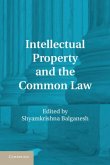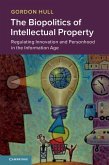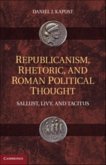Transition and Coherence in Intellectual Property Law (eBook, PDF)
Essays in Honour of Annette Kur
Redaktion: Bruun, Niklas


Alle Infos zum eBook verschenken

Transition and Coherence in Intellectual Property Law (eBook, PDF)
Essays in Honour of Annette Kur
Redaktion: Bruun, Niklas
- Format: PDF
- Merkliste
- Auf die Merkliste
- Bewerten Bewerten
- Teilen
- Produkt teilen
- Produkterinnerung
- Produkterinnerung

Hier können Sie sich einloggen

Bitte loggen Sie sich zunächst in Ihr Kundenkonto ein oder registrieren Sie sich bei bücher.de, um das eBook-Abo tolino select nutzen zu können.
The nature and content of intellectual property (IP) law, which is heavily contingent on the state of technology and on social and market developments, has always been subject to ongoing transitions. How those transitions are effected and the shape they take is crucial to the ability of IP to achieve its stated goals and provide the necessary climate for investment in creativity, innovation and brand differentiation. Yet the need for change can run headlong into a desire for coherence. A search for coherence tests the limits of the concept of "e;intellectual property,"e; is imperiled…mehr
- Geräte: PC
- mit Kopierschutz
- eBook Hilfe
- Größe: 6.05MB
- FamilySharing(5)
![Intellectual Property and the Common Law (eBook, PDF) Intellectual Property and the Common Law (eBook, PDF)]() Intellectual Property and the Common Law (eBook, PDF)34,95 €
Intellectual Property and the Common Law (eBook, PDF)34,95 €![Exhausting Intellectual Property Rights (eBook, PDF) Exhausting Intellectual Property Rights (eBook, PDF)]() Shubha GhoshExhausting Intellectual Property Rights (eBook, PDF)90,95 €
Shubha GhoshExhausting Intellectual Property Rights (eBook, PDF)90,95 €![Islamic Vision of Intellectual Property (eBook, PDF) Islamic Vision of Intellectual Property (eBook, PDF)]() Ezieddin ElmahjubIslamic Vision of Intellectual Property (eBook, PDF)31,95 €
Ezieddin ElmahjubIslamic Vision of Intellectual Property (eBook, PDF)31,95 €![Biopolitics of Intellectual Property (eBook, PDF) Biopolitics of Intellectual Property (eBook, PDF)]() Gordon HullBiopolitics of Intellectual Property (eBook, PDF)24,95 €
Gordon HullBiopolitics of Intellectual Property (eBook, PDF)24,95 €![History of Intellectual Property in 50 Objects (eBook, PDF) History of Intellectual Property in 50 Objects (eBook, PDF)]() History of Intellectual Property in 50 Objects (eBook, PDF)26,95 €
History of Intellectual Property in 50 Objects (eBook, PDF)26,95 €![Human Rights and Intellectual Property (eBook, PDF) Human Rights and Intellectual Property (eBook, PDF)]() Laurence R. HelferHuman Rights and Intellectual Property (eBook, PDF)45,95 €
Laurence R. HelferHuman Rights and Intellectual Property (eBook, PDF)45,95 €![International Intellectual Property and the ASEAN Way (eBook, PDF) International Intellectual Property and the ASEAN Way (eBook, PDF)]() International Intellectual Property and the ASEAN Way (eBook, PDF)28,95 €
International Intellectual Property and the ASEAN Way (eBook, PDF)28,95 €-
-
-
Dieser Download kann aus rechtlichen Gründen nur mit Rechnungsadresse in A, B, BG, CY, CZ, D, DK, EW, E, FIN, F, GR, HR, H, IRL, I, LT, L, LR, M, NL, PL, P, R, S, SLO, SK ausgeliefert werden.
- Produktdetails
- Verlag: Cambridge University Press
- Erscheinungstermin: 7. Januar 2021
- Englisch
- ISBN-13: 9781108695916
- Artikelnr.: 66180404
- Verlag: Cambridge University Press
- Erscheinungstermin: 7. Januar 2021
- Englisch
- ISBN-13: 9781108695916
- Artikelnr.: 66180404
- Herstellerkennzeichnung Die Herstellerinformationen sind derzeit nicht verfügbar.
toward understanding; Part I. Transition; Section 1. Forms and
institutions: 1. Transitional provisions in intellectual property
legislation; 2. Judicial creativity and transitions in EU IP law; 3. Before
and after designers guild: another look at appellate deference in New
Zealand's copyright law; 4. EU design law: transitioning towards coherence?
15 years of national case law; 5. Copyright and the CJEU - some structural
deficits as seen from a german perspective; Section 2. International
commitments and constraints: 6. Global intellectual property: transition
and coherence through rules of interpretation; 7. Article 20 of the TRIPS
agreement: up in smoke?; 8. Implementing international obligations at the
national level; 9. Multiple and overlapping transitions in IP; 10.
Transition and continuity in the private international law of intellectual
property; 11. From nintendo wii to perfumes, driving a BMW car: a tale of
transition to the wrong kind of coherence; Section 3. New agents and the
challenge of new technologies: 12. Transition through automation; 13. Eye,
robot: artificial intelligence and trade mark registers; 14. Patent
protection of inventions involving artificial intelligence; 15. Automated
profiling in new media and entertainment markets: what to protect, and
how?; Part II. Coherence; Section 4. Intellectual "property" and its
limits: 16. The (lack of) coherence of data ownership with the intellectual
property system; 17. The threefold fictitiousness of intellectual property;
18. An intellectual property structural engineer extraordinaire and her
lifelong quest for coherence; 19. Open yet secret: trading of tangible
goods and trade secrets; 20. From smorgasbord to new Nordic cuisine:
EU-harmonization of trade secrets protection in the Nordic countries; 21.
Trade mark rights and parallel imports vis-à-vis the never-ending evolution
of the behavior of firms: transition and coherence put to a test; 22. Legal
concept of "exhaustion": exhausted?; 23. Building coherence in
technological transitions: putting exploitation at the core of intellectual
property; 24. 'Accessory exhaustion' - and use of a work as a work; Section
5. IP overlaps: 25. Intellectual property in transition: the several sides
of overlapping copyright and trademark protection; 26. Cultural heritage
and the public domain: what the us's myriad and mayo can teach Oslo's angry
boy; 27. Public order in the light of aesthetic theory - the
copyright/trademark interface after vigeland; 28. Separability as
channeling: a cautionary tale; 29. Novelty, idea or new meaning as criteria
for copyright protection?: transitions in swedish design law; 30. Examining
functionality; 31. Substantial value and the concept of shapes; 32.
Copyright and patents on software: the UPC's answer to an old problem of
intellectual property overlaps; 33. Chopping off Hydra's heads: spare parts
in EU design and trade mark law; Section 6. (Un-) fairness; 34.
Geographical indications as intellectual property rights: beyond transition
and coherence?; 35. Presence or absence of coherence in trade identity
protection in the European Union; 36. Virtue ethics and private law - a
sketch; 37. Closing the gap: how EU law constrains national rules against
imitation?; 38. European Union law and slavish imitation - an 'update' in
honour of Annette Kur; 39. The german misappropriation origins of trademark
antidilution doctrine: a translation of the 1924 odol opinion of the
Elberfeld Landgericht; 40. The relationship between the unfair competition
regime and IP law; 41. Comparative advertising: does trade mark law over-
or under- protect the average consumer? A couple of recent examples of
Asian jurisdictions going their own way; Conclusion: 42. Transition and
coherence in intellectual property law.
toward understanding; Part I. Transition; Section 1. Forms and
institutions: 1. Transitional provisions in intellectual property
legislation; 2. Judicial creativity and transitions in EU IP law; 3. Before
and after designers guild: another look at appellate deference in New
Zealand's copyright law; 4. EU design law: transitioning towards coherence?
15 years of national case law; 5. Copyright and the CJEU - some structural
deficits as seen from a german perspective; Section 2. International
commitments and constraints: 6. Global intellectual property: transition
and coherence through rules of interpretation; 7. Article 20 of the TRIPS
agreement: up in smoke?; 8. Implementing international obligations at the
national level; 9. Multiple and overlapping transitions in IP; 10.
Transition and continuity in the private international law of intellectual
property; 11. From nintendo wii to perfumes, driving a BMW car: a tale of
transition to the wrong kind of coherence; Section 3. New agents and the
challenge of new technologies: 12. Transition through automation; 13. Eye,
robot: artificial intelligence and trade mark registers; 14. Patent
protection of inventions involving artificial intelligence; 15. Automated
profiling in new media and entertainment markets: what to protect, and
how?; Part II. Coherence; Section 4. Intellectual "property" and its
limits: 16. The (lack of) coherence of data ownership with the intellectual
property system; 17. The threefold fictitiousness of intellectual property;
18. An intellectual property structural engineer extraordinaire and her
lifelong quest for coherence; 19. Open yet secret: trading of tangible
goods and trade secrets; 20. From smorgasbord to new Nordic cuisine:
EU-harmonization of trade secrets protection in the Nordic countries; 21.
Trade mark rights and parallel imports vis-à-vis the never-ending evolution
of the behavior of firms: transition and coherence put to a test; 22. Legal
concept of "exhaustion": exhausted?; 23. Building coherence in
technological transitions: putting exploitation at the core of intellectual
property; 24. 'Accessory exhaustion' - and use of a work as a work; Section
5. IP overlaps: 25. Intellectual property in transition: the several sides
of overlapping copyright and trademark protection; 26. Cultural heritage
and the public domain: what the us's myriad and mayo can teach Oslo's angry
boy; 27. Public order in the light of aesthetic theory - the
copyright/trademark interface after vigeland; 28. Separability as
channeling: a cautionary tale; 29. Novelty, idea or new meaning as criteria
for copyright protection?: transitions in swedish design law; 30. Examining
functionality; 31. Substantial value and the concept of shapes; 32.
Copyright and patents on software: the UPC's answer to an old problem of
intellectual property overlaps; 33. Chopping off Hydra's heads: spare parts
in EU design and trade mark law; Section 6. (Un-) fairness; 34.
Geographical indications as intellectual property rights: beyond transition
and coherence?; 35. Presence or absence of coherence in trade identity
protection in the European Union; 36. Virtue ethics and private law - a
sketch; 37. Closing the gap: how EU law constrains national rules against
imitation?; 38. European Union law and slavish imitation - an 'update' in
honour of Annette Kur; 39. The german misappropriation origins of trademark
antidilution doctrine: a translation of the 1924 odol opinion of the
Elberfeld Landgericht; 40. The relationship between the unfair competition
regime and IP law; 41. Comparative advertising: does trade mark law over-
or under- protect the average consumer? A couple of recent examples of
Asian jurisdictions going their own way; Conclusion: 42. Transition and
coherence in intellectual property law.







